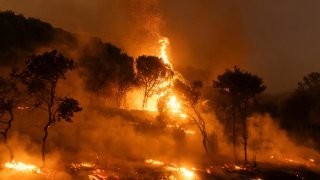
More than 600 firefighters, including reinforcements from several European countries and backed by a fleet of water-dropping planes and helicopters, were tackling the remnants of three major wildfires in Greece Sunday, two of which have been raging for days.
Greece has been plagued by daily outbreaks of dozens of fires over the past week as gale-force winds and hot, dry summer conditions combined to whip up flames and hamper firefighting efforts. Across the country, firefighters were battling 105 wildfires on Sunday, with 46 of them having broken out in the 24 hours between Saturday evening and Sunday evening, the fire department said.
Authorities are investigating the causes of the blazes, with arson suspected in some.
In Greece's northeastern regions of Evros and Alexandroupolis, a massive wildfire believed to have caused 20 of the 21 wildfire-related deaths in the past week, was burning for a ninth day.
The blaze, where smaller fires combined to form one of the largest single wildfires ever to have struck a European Union country, has decimated vast tracts of forest and burned homes in outlying areas of the city of Alexandroupolis.
On Sunday, 295 firefighters, seven planes and five helicopters were tackling flare-ups that were creating new fire fronts, triggering evacuation orders for two villages, one in the Evros region and another in the Rodopi region.
The wildfire has scorched 297 square miles of land and had 120 active hotspots, the European Union’s Copernicus Emergency Management Service said Sunday.
U.S. & World
Copernicus is the EU space program’s Earth observation component and uses satellite imagery to provide mapping data.
Pope Francis, addressing the public in St. Peter’s Square in the Vatican on Sunday, said he wanted to express assurances that he is remembering “in prayer the victims of the fires that have burned in these days in northeast Greece.” He also expressed “supportive closeness” to the Greek people.
On the northwestern fringes of the Greek capital, another major wildfire burning for days was now limited to flare-ups and was being tackled by 160 firefighters, one plane and three helicopters. The fire has already scorched homes and part of a national park on Mount Parnitha, one of the last green areas near Athens.
A third major wildfire started on Saturday on the Cycladic island of Andros and was still not under control Sunday, with 73 firefighters, two planes and two helicopters dousing the blaze. Lightning strikes are suspected of having sparked that wildfire. Flare-ups were also occurring in a large wildfire in the central region of Viotia, the fire department said.
With firefighting forces stretched to the limit, Greece has called for help from other European countries. Germany, Sweden, Croatia and Cyprus have sent aircraft, while dozens of Romanian, French, Czech, Bulgarian, Albanian, Slovak and Serb firefighters are helping on the ground.
With their hot, dry summers, southern European countries are particularly prone to wildfires. European Union officials have blamed climate change for the increasing frequency and intensity of wildfires in Europe, noting that 2022 was the second-worst year for wildfire damage on record after 2017.
The causes of Greece’s two largest fires have not yet been determined. For some of the smaller blazes, officials have said arson or negligence is suspected, and several people have been arrested.
On Saturday, fire department officials arrested two men, one on the island of Evia and one in the central Greek region of Larissa, for allegedly deliberately setting fire to dried vegetation to spark wildfires.
Greece imposes wildfire prevention regulations, typically from the start of May to the end of October, limiting activities such as the burning of dried vegetation and the use of outdoor barbecues.
By Friday, fire department officials had arrested 163 people on fire-related charges since the start of the fire prevention season, government spokesman Pavlos Marinakis said, including 118 for negligence and 24 for deliberate arson. The police had made a further 18 arrests, he said.
____
Frances D'Emilio in Rome contributed to this report.



